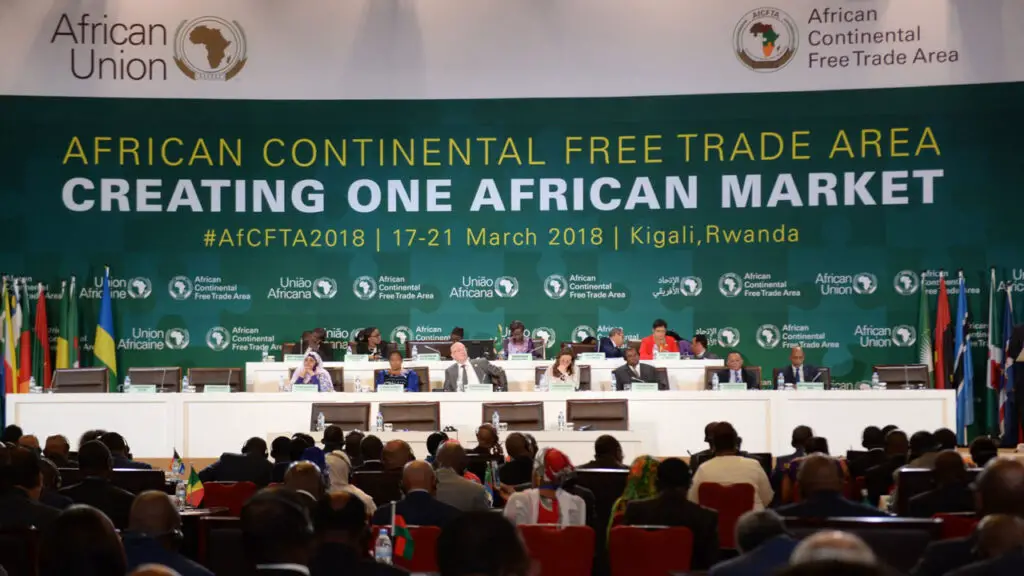- The agreement reaffirms the US commitment to elevating a strong private sector voice in AfCFTA implementation.
- Through exploring these challenges and opportunities in-depth, the U.S.-Africa Leaders Summit seeks to chart new avenues for improved U.S.-Africa cooperation.
- The business forum focuses on growing the commercial partnership between the U.S. and Africa, with priority discussion topics including the U.S.-Africa commitment to trade and investment.
The United States Chamber of Commerce’s U.S.-Africa Business Center (USAfBC) and the African Continental Free Trade Area Secretariat (AfCFTA) on Wednesday signed a Memorandum of Understanding (MoU) to launch a working group to help advance trade and investment between the U.S. and Africa.
The agreement reaffirms the US commitment to elevating a strong private sector voice in AfCFTA implementation.
Scott Eisner, President of the U.S.-Africa Business Center, said coordination between the private sector and the AfCFTA is key to unlocking Africa’s full economic potential.
“As the world’s leading business organization, the U.S. Chamber of Commerce is proud to be a strong voice for private sector business, which is a major stakeholder and beneficiary of the AfCFTA,” said Eisner.
He noted that the creation of the working group will provide a key platform for members of the U.S.-Africa Business Center to engage with policy experts and senior government officials on issues critical to the U.S.-Africa trade and investment space, with a particular focus on the digital economy, trade facilitation and customs modernization, and value chain development.
The move comes as the African continent insists that now is not the time for aid, but trade.
The African Continental Free Trade Area (AfCFTA) is uniting 54 nations into the world’s largest trade bloc with the aim of growing Africa’s GDP by $450 billion through trade and underpinned by a population set to double by 2050.
Elsner was speaking at the U.S. – Africa Business Forum at the sidelines of the US Africa Leaders Summit. (https://rpdrlatino.com/)
The business forum focuses on growing the commercial partnership between the U.S. and Africa, with priority discussion topics including the U.S.-Africa commitment to bolstering trade and investment flows, promoting innovation and digital transformation, strengthening regional and global health, addressing food security, and supporting climate sustainability.
Through exploring these challenges and opportunities in-depth, the U.S.-Africa Leaders Summit seeks to chart new avenues for improved U.S.-Africa cooperation.
“The continent’s potential for U.S. business remains largely underestimated and misunderstood, but the time for the U.S. to tap into the world’s next big growth market is now–accelerating growth in Africa and at home,” Elsiner noted.
The USABF aims to deliver ambitious, quantitative outcomes that leverage the immense power of Africa’s digital revolution, promote free trade and integrated, resilient supply chains, support healthier economies, and ensure sustainable infrastructure investment. Looking beyond the discussions during the USABF, all stakeholders should commit to driving real action on priorities in the months and years to come.
IFC forges partnership with Africa, LATAM and Caribbean countries
Meanwhile, at the same summit, the International Finance Corporation (IFC)announced its support for a new partnership among countries in the Caribbean, Latin America, and Africa to boost the regional production of pharmaceuticals and strengthen health systems, which will require the active involvement of the private sector to succeed.
IFC will seek to contribute to the transatlantic alliance for health and pharmaceutical equity established during the 27th U.N. Climate Change Conference of the Parties (COP27) by the governments of Barbados, Guyana, and Rwanda.
The initiative, which is open to other countries in these regions, wants to use inter-governmental, South-South cooperation to help achieve the development and manufacturing of 60 percent of all essential pharmaceuticals for the populations of the Caribbean, Africa, and Latin America, and within their respective continents by 2040.
“The role of the private sector is critical to strengthening healthcare by making supply chains more regional and resilient, especially in pharmaceuticals,” said IFC Managing Director Makhtar Diop. “IFC is already taking steps to support nations in the Africa and Latin America & Caribbean regions to build and grow their manufacturing capacity in pharmaceuticals and vaccines, and supporting this partnership only builds on that urgent mission.”
Diop announced his support for the initiative on the sidelines of the U.S.-Africa Leaders’ Summit, where he met with Prime Minister of Barbados Mia Amor Mottley and President of Rwanda Paul Kagame at IFC’s headquarters in Washington D.C.
“By matching capacity with political will, we have created a platform that will undoubtedly benefit both Africa, and the Caribbean and Central and Latin America region, by allowing our region and the wider Global South to achieve pharmaceutical equity for our people, while providing opportunities for our citizens in this region whose expertise is in the area of sciences,” said Prime Minister of Barbados Mottley. “I want to express sincere thanks to IFC and Managing Director Makhtar Diop for their support of this initiative, as I truly believe it is a strong signal to the wider world, that this transatlantic alliance to manufacture 60 percent of all essential pharmaceuticals for the people of the Caribbean, Africa, and Latin America by 2040 is one that is greatly needed.”
The initiative is also being supported by kENUP Foundation, and will seek to focus cooperation on oncological drugs, preventive and therapeutic vaccines, as well on improving women’s health outcomes.
“I am thankful we could come together today in support of this transatlantic alliance,” said President Kagame of Rwanda. “I want to thank especially the Prime Minister of Barbados, Mia Amor Mottley, for building this bridge, and IFC’s Managing Director Makhtar Diop, for his involvement.”
